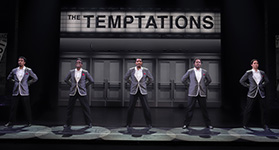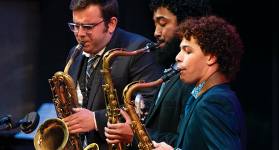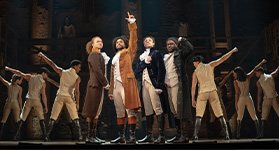Edward G. Smith

Nationally known for his Midas touch as a director, Edward G. Smith’s career began in 1965 as an actor in Philadelphia and has continued to the present as a theatre director and producer. Smith’s goal to end his career as the Artistic Director of a professional African American theatre lead him Fort Worth, Texas as Artistic Director of Jubilee Theatre. Smith opened his season directing August Wilson’s Joe Turner’s Come and Gone. As Artistic Director of Jubilee Theatre, along with directing, Smith’s initiatives included classes for children, readings, workshops and late-night performances by jazz and/or blues musicians and poets. During his tenure at Jubilee Theatre, he invited other locally and nationally renowned artistic directors to showcase: Ron Himes, Vickie Washington, Akin Babatunde and Lori Hayes, to name a few. In honor of the 2008 Kara Walker exhibition at Modern Art Museum of Fort Worth in 2008, Smith presented a collaborative theatrical piece. After four years and many accomplishments, Smith retired from Jubilee Theater in 2010.
Growing up in Philadelphia during the 1950s was tough. Smith, a three-time amateur middle weight champion boxer, who had to fight to survive, had his mind set on becoming a jazz saxophonist. Through the movie Body and Soul and the play Six Characters in Search of an Author, Smith became fascinated with the power of acting and the exhilaration of live theatre. This fascination and exhilaration lead him to HB Studio in New York and then with Jasper Deter, in 1965, at the Hedgerow Theatre in Philadelphia. Deter, a noted director of Eugene O’Neil’s plays was Smith’s first mentor. 1965 in New York, he studied with Maxwell Glanville at the American Community Theatre and this is where his understanding of acting took flight.
The cries of “Black Power” brought home the importance of black identity and empowerment. The Black Theatre Movement was seen as an essential instrument in the struggle. His lengthy career focused on the uplifting of the culture and uniting people from every background.
- 1969 – Took on his first directing project in Buffalo, New York.
- 1970-1974 – Founder and Artistic Director of the Buffalo Black Drama Workshop. Their aim was to train young actors, nurture their spirits through education and to raise the level of awareness of black audiences about the social and political conditions of the times.
- 1976 – Co-founder of Black Theatre Canada in Toronto.
- 1980-1981 – Founder and Artistic Director of Buffalo Black Dinner Theatre. He was a contributing essayist in Ethnic Theatre in the United States, edited by Maxine Schwartz Seller (1983). Smith’s original direction of Dr. Endesha Ida Mae Holland’s play From the Mississippi Delta, premiered at Buffalo’s Ujima Theatre Company, and is documented in History of African American Theatre and published by the Cambridge University Press (2002) (Holland’s 1986 drama, chronicling her rise to fame, was nominated for the Pulitzer Prize.)
- 1988 – Graduated with a MA and earned full professorship at State University of New York at Buffalo (SUNY-Buffalo) and taught in both the African American Studies Department and in the Department of Theatre and Dance at the institution.
- 1991-1993 – Visiting professor at the University of California at Los Angeles in the Department of Theatre.
- 1993-1996 – First African American Associate Artistic Director of the Alabama Shakespeare Festival in Montgomery, Al.
- 1996-1998 – Professor in the Department of Theatre at Florida State University in Tallahassee, FL.
- 1998-2001 – Professor at Wayne State University teaching graduate courses in acting and African American Theatre Studies, a mentor at the prestigious Hilberry Repertory Theatre Company, and the Director of the Department’s Black Theatre Program. Also, named Best Director by the Detroit Free Press for his work at the HiIberry Theatre for the play Our Town.
- 2002 – Summoned by Broadway accomplished director, Lloyd Richard’s, to direct A Last Dance for Sybil by Ossie Davis. A Last Dance for Sybil starred Ruby Dee, Earle Hyman, and Count Strovall at Woodie King, Jr.’s, New Federal Theatre in New York.
- 2006-2010 – Artistic Director at Jubilee Theatre in Fort Worth, TX
- From 2010 to current he has continued his love for the arts. Plays he has written and nationally performed include: Home for the Holidays; Travelin’ Light; Love You Madly (inspired by the music of Duke Ellington and Frank Foster); Let the Sun Shine on Me; Butterfly Dreams; Mahalia: The Gospel Queen; It’s Easier to Get Dope Than It is to Get a Job; Now Time; and Songs My Mother Sang. Smith has directed over 150 plays including: A Raisin in the Sun, A Soldier’s Play; Blues for An Alabama Sky; Don’t Bother Me, I Can’t Cope; Fences; Flying West; I’m Not Rappaport; Jitney; Lady Day at Emerson’s Grill; Ma Rainey’s Black Bottom; Miss Ever’s Boys; Othello; Seven Guitars, and Topdog/Underdog.
Smith’s international acclaim has taken him to Toronto, Canada; Kingston, Jamaica, and West Indies Barbados. His achievements and Awards include: St. Louis Theatre Circle (2013) Best Director-Best Play Ensemble for The Whipping Man; National Black Theatre Festival, 2009, The Lloyd Richard’s Distinguished Director’s Award; Fort Worth Star Telegram, 2008, Best Play Directing, The Bluest Eye; St. Louis Theatre Circle, 2006, Best Director, Best Play, Joe Turner’s Come and Gone; Oakland Press, 2002, Detroit, Michigan, Best Director Cat on a Hot Tin Roof; Detroit Free Press, 2000, Best Play-Best Director Our Town; Governor’s Outstanding Artist 1996, Men’s Fellowship, Montgomery, Alabama; Audelco Awards, New York, New York 1989, Nominated Best Director From the Mississippi Delta; and St. Louis Black Rep Theatre; The Woodie King, Jr. Lifetime Achievement Award 2021.
His publications include: Black Theatre in the United States, editor Maxine Schwartz Sellers and Ed Smith: Growing Jubilee Theatre, 2007, Expressions Magazine. Smith has performed/directed plays in other theatres including:
- Mount Holyoke College Laboratory Theatre (South Handley, Massachusetts)
- African Cultural Canter Theatre (Buffalo, New York)
- Theatre Loft (Buffalo, New York)
- New Freedom Theatre (Philadelphia, Pennsylvania)
- The Studio Arena (Buffalo, New York)
- Soul Rep Theatre (Dallas, Texas)

























